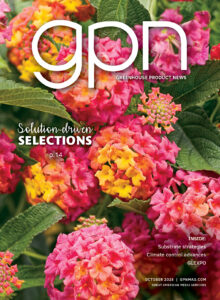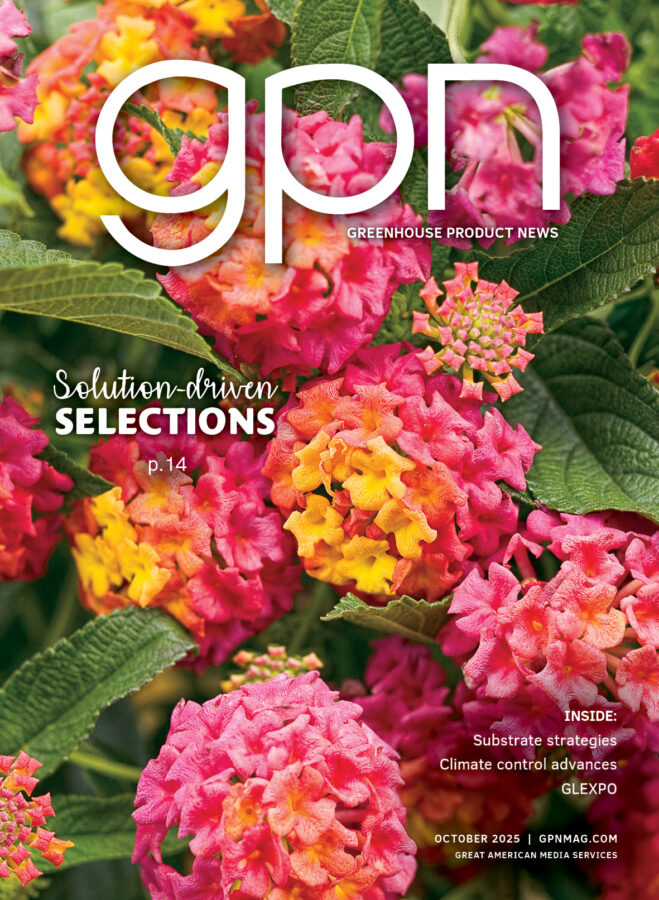Forty Under 40 Perspectives: Research innovations shape the future of floriculture
Today’s growers are challenged with keeping operating costs low while always delivering high-quality plant products. Today’s consumers want more than just beautiful flowers; they demand plants that are unique, resilient and sustainably grown.

Fortunately, advances in plant science are helping growers and breeders deliver on all these fronts. New discoveries and innovations in areas like plant pathology, cell biology, tissue culture, molecular breeding and bioengineering are empowering the floriculture industry to create stunning plants that are adapted to our changing world.
HEALTH, BEAUTY THROUGH RESEARCH
Disease is one of the biggest threats to greenhouse-grown flowers, but innovations in plant pathology are helping growers fight back. With advanced diagnostic tools, growers partnered with expert plant pathologists can detect diseases early — often before the plants even show symptoms. Along with greenhouse scouting, monitoring and proper greenhouse sanitation protocols, these methods can allow us to act quickly and ensure healthy, high-quality products for growers that also preserve the visual appeal customers have come to expect.
NEW PRODUCTS USING CELL BIOLOGY
Cell biology techniques, like interspecific hybridization, allow breeders to cross flowers that, for a variety of reasons, might not have been able to be crossed in the field. Love the flower power of one species but wish it had the color range of another? Interspecific hybridization is one way breeders and scientists work together to create these “wide crosses” between species to create new combinations that would not have been otherwise possible. It’s very likely that some of your favorite flower products are the result of one of these novel crosses.
SUSTAINABLE FLOWERS
Molecular breeding, previously only available in row crops, is a powerful tool to support floriculture breeders in creating new products. Scientists can now sequence a plant’s entire genetic code, or genome, and identify the source of specific traits — like color, scent or resilience — at the genetic level. These tools can get new products to market faster by helping breeders make selections through DNA sequencing early in the breeding process instead of waiting for flowers to mature. While these tools might require a higher upfront investment, the reduced cost of greenhouse space, labor and breeding cycle time can make that investment worthwhile.
Molecular breeding can also play a critical role in sustainability. Breeding flowers with improved water efficiency means they can thrive with less irrigation, a big plus for greenhouse growers in water-scarce regions. And pest-resistant varieties require fewer pesticides, which is safer for the environment and everyone handling the plants.
CONSISTENCY, QUALITY THROUGH TISSUE CULTURE
Tissue culture, where plants are propagated in a controlled, sterile laboratory environment, is a critical component of the floriculture supply chain. Research investments in tissue culture allow companies to produce large numbers of identical, disease-free plants in the lab when it would otherwise not be possible.
FLOWERS OF THE FUTURE
Bioengineering is pushing the boundaries of what’s possible in floriculture and can help breeders develop flowers with one-of-a-kind traits. These bioengineered traits don’t just enhance the flowers’ appearance, they can also potentially make plants more resilient and reduce the need for PGRs and other chemical treatments. With bioengineering, floriculture can offer bold flowers that also meet high standards for sustainability.
CLIMATE ADAPTATION
Greenhouse floriculture growers continue to face new challenges and each of these scientific innovations play a part in helping the industry adapt. Tissue culture provides a steady supply of healthy, resilient plants. Molecular breeding and bioengineering can help create varieties that will handle drought, heat and other climate stresses. Plant pathology reduces the need for chemicals by focusing on early disease detection. Together, these tools create a production system that’s well-suited to handle the pressures of climate change while meeting the growing demand for eco-friendly products.









 Video Library
Video Library 


















